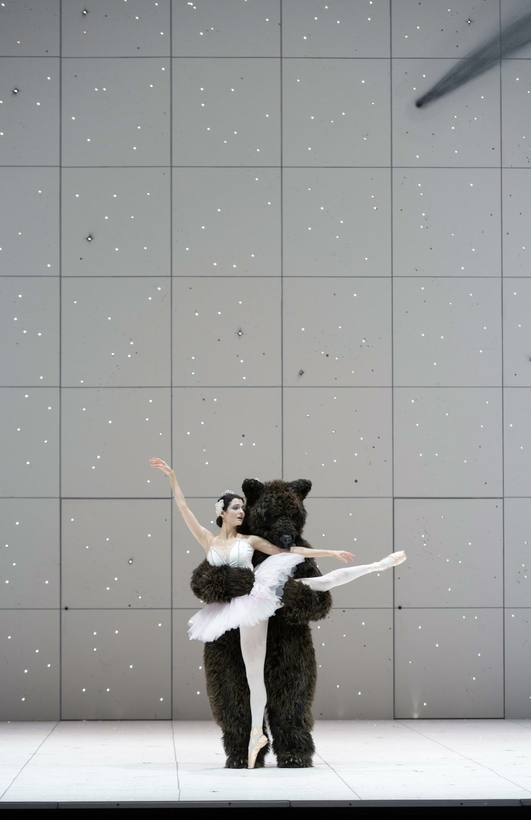The knee-jerk definition of “Gogolesque”—“reminiscent of the works of Nikolai Gogol”—isn’t much help, is it? For a clearer read, brush up on The Nose, in which the said body part detaches itself from the face of a minor official and goes on a tear through imperial St. Petersburg disguised as a personage to reckon with. Satirical, grotesque, surreal, and exploding at the seams with zesty personalities up and down the social scale, The Nose is a textbook case of the Gogolesque.
Here’s another: Nikolai Rimsky-Korsakov’s operatic adaptation of Gogol’s novella Christmas Eve, filmed live at Oper Frankfurt exactly a year ago. Set mostly in the village of Dikanka in the writer’s native Ukraine, the shaggy-dog fairy tale unfolds on a long winter’s night you might well mistake for Halloween. The skeletal plot concerns the naïf young blacksmith Vakula, who is smitten with Oksana, a local landowner’s pampered daughter. She will have Vakula, she teases none too gently, if only he can fetch her the Tsarina’s slippers from St. Petersburg, which might as well be on the moon.
Time for some magic! Alas, Vakula can expect no help from his mother, the witch Solokha, who has independent designs on the rich man’s property. But when the Devil, the mayor, the deacon, and Oksana’s father show up one by one to make secret whoopee with Solokha, a supernatural transport option materializes. Off Vakula flies to make his dream come true.

Christof Loy’s award-winning production serves up enchantment in a brightly lit, big white infinity box where the spheres of ordinary mortals and diabolical spirits intersect as smoothly as in the woods of A Midsummer Night’s Dream. In symphonic interludes, another order of being supervenes, inspired by the pantheism of Rimsky-Korsakov, who saw divinity throughout the universe and all things in it. His pagan ideas of cosmic self-renewal are reflected in two grand pas de deux, choreographed by Klevis Elmazaj, for a ballerina along the lines of Aurora from The Sleeping Beauty and a giant brown bear—each of them an astral projection from the depths of the Russian soul.
Georgy Vasiliev and Julia Muzychenko are picture-perfect as the lovers, and they sound good, too. Enkelejda Shokza goes wild as the frowsy, lusty Solokha. Thomas Faulkner plays the ogre Patsyuk from within a giant suit fit for Monopoly’s Rich Uncle Pennybags. Gorgeous in flaming red, the willowy Bianca Andrew shines as the imperious Tsarina, disarmed by Vakula’s innocence. Ayelet Polne dances the ballerina role, identified as Kolyada, the Virgin Goddess. She has not one partner but two: Borka Culebras as Ovesen, God of Spring, and Pascu Ortí as the Bear, who is in some sense Ovesen’s double. Sebastien Weigle conducts, superbly.
A word of counsel: If the early scenes test your patience, and this could happen, fast forward 89 minutes to Vakula’s liftoff into outer space. You’ll miss some good stuff but still catch the best: the Witches’ Sabbath, the ravishing polonaise at court, the Gogolesque donnybrook between village gossips agog with misinformation, and a happy ending to put a carol in your heart.
Christmas Eve is available for streaming on the YouTube OperaVision channel through January 3
Matthew Gurewitsch writes about opera and classical music for AIR MAIL. He lives in Hawaii

